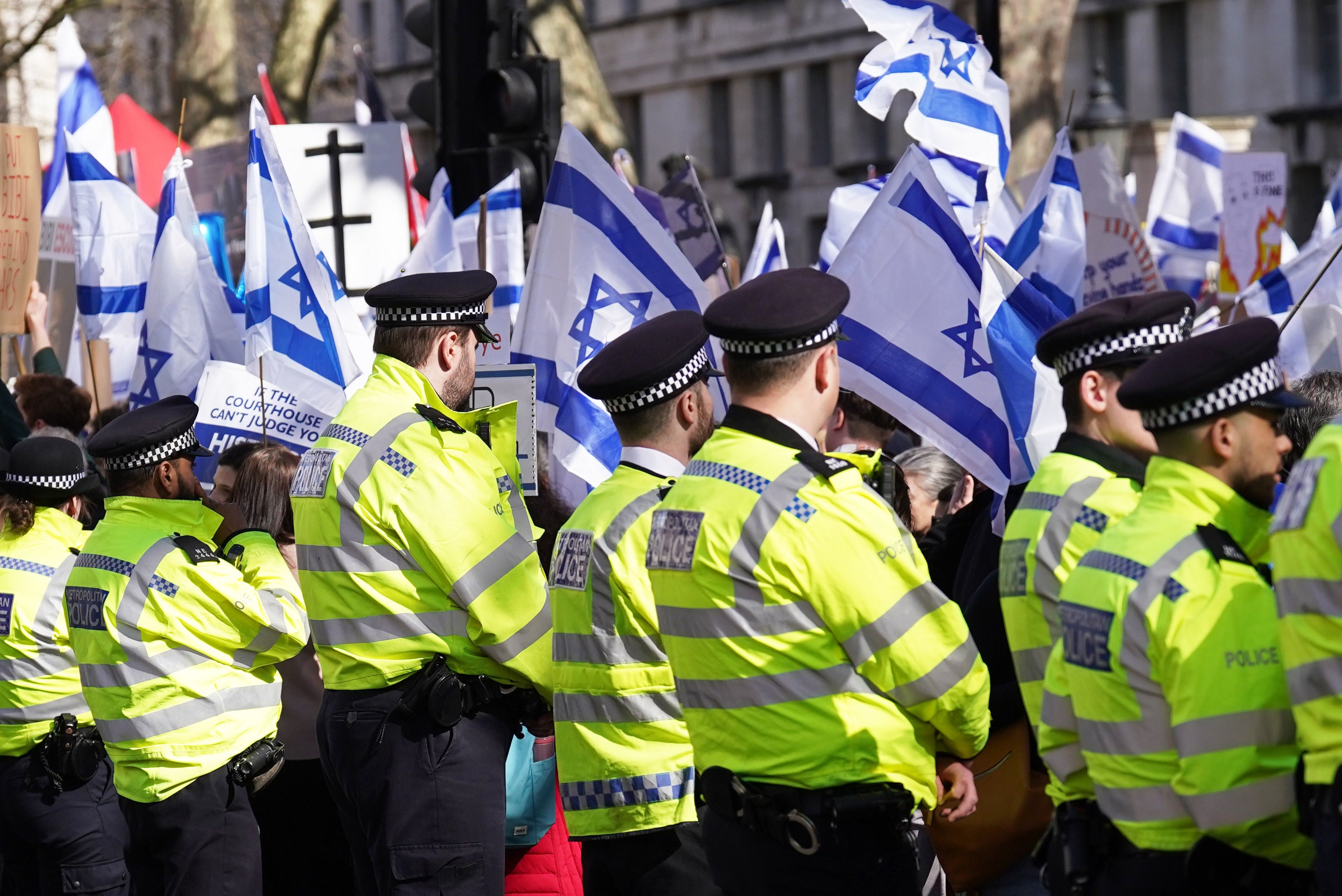
Rishi Sunak has challenged Benjamin Netanyahu on his controversial judicial overhaul but otherwise spoke of strengthening ties as the Israeli prime minister faces a wave of protests.
Shouts of “shame” followed Mr Netanyahu to Downing Street, where hundreds of pro-democracy protesters amassed to warn against a slide towards autocracy.
Mass protests were sparked in Israel by legislation protecting Mr Netanyahu from being deemed unfit to rule, which critics say will shield him from his corruption trial.
Downing Street said the 45-minute meeting focused on “strengthening the close partnership” between the two nations and their backing of a free trade agreement.

“Shared security and defence challenges” such as Russia’s invasion of Ukraine and the threat posed by Iran were prominent in the discussion.
But Mr Sunak did dedicate a smaller part of the meeting to raising difficult subjects, including “international concern at growing tensions in the West Bank and the risk of undermining efforts towards the two-state solution” to the Israeli-Palestinian conflict.
“The prime minister stressed the importance of upholding the democratic values that underpin our relationship, including in the proposed judicial reforms in Israel,” a statement from No 10 said, hinting at a delicate challenge of his policy.
Mr Sunak said he looked forward to visiting Israel at the “earliest opportunity” after being extended an invite by Mr Netanyahu. Asked whether Mr Sunak is concerned about fostering closer ties amid the current situation, Downing Street stressed that Israel is a “vital international partner”.
The foreign affairs committee chair Alicia Kearns said Britain must be a “critical friend” by challenging Israel.
She told BBC Radio 4’s World At One the judicial overhaul has provoked “the biggest response and loudest response I’ve ever seen from a Jewish community to Israeli policies”.
Mr Netanyahu, who was also due to meet home secretary Suella Braverman, was forced to delay his travel to the UK amid mass protests in Israel which have seen major roads blocked and scuffles with police.
As Mr Sunak greeted him outside No 10, cries of “Busha”, or shame in Hebrew, could be heard from the protesters lining Whitehall.
One sign branded Mr Netanyahu a “dictator on the run” as he faces domestic turmoil after his right-wing nationalist coalition approved the controversial law.
Members of the crowd urged Mr Sunak to “stand up for democracy” in Israel. Talli, an Israeli tech worker who has been living in London for six years, said she was protesting against Mr Netanyahu’s “judicial coup”.
“He’s trying to gain power while on trial and he’s trying to turn Israel into a non-democratic country,” she said. “We want not just Rishi Sunak but the international community and leaders to apply pressure on Netanyahu – whether it’s financial deals, or anything at all – to back down on this coup.
“My family and friends all live in Israel and I’m worried about their futures.”
Chamutal Isaacs, a childbirth support worker who moved to London from Tel Aviv 32 years ago, said the overhaul would mean “an end to any sort of democracy in Israel”.
“I want Rishi Sunak to say to him he must lose his chair, he can’t continue to be the prime minister of Israel. He’s destroying democracy in Israel,” she said.
Sir Ephraim Mirvis, Britain’s Chief Rabbi, has issued a plea for Jewish unity, while urging Israel to "hold fast to the principles upon which it was founded". The Biden administration is also losing patience with its traditional ally.
After a series of scandals involving wealthy associates, Mr Netanyahu is on trial for fraud, breach of trust and accepting bribes. He denies any wrongdoing.
Critics say his government, the most right-wing in Israel’s history, is dragging the nation towards authoritarianism by upending its system of checks and balances.
A smaller number of Palestinian protesters were also in Westminster.
Oxfam policy adviser Richard Stanforth said: “It is unconscionable that the prime minister is rolling out the red carpet for Benjamin Netanyahu with the aim of deepening diplomatic ties, despite the Israeli government committing horrific human rights violations every day, seemingly with impunity.”
Amnesty International UK’s Kristyan Benedict accused the UK government of “turning a blind eye to apartheid atrocities”.
“Netanyahu is more concerned with seeking legitimacy for his government rather than addressing its increasingly extremist policies, his occupation forces in the Palestinian territories killing civilians, stealing their land and building illegal new settlements,” he said.
“The UK and Israel’s rejection of this reality will not change the truth or illegality of the current situation. All it does is help entrench Israel’s racist system of apartheid against Palestinian people.”







